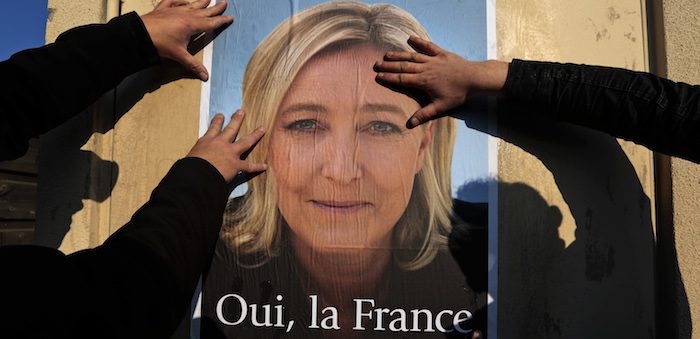As the French election cycle came to a close this April, Incumbent French President Emmanuel Macron emerged victorious with 58.5 percent of the vote. He did so despite significant concerns surrounding his popularity as a candidate. Nevertheless, when we consider turnout, he technically only captured 38.5 percent of the French population. This recent election mirrors the one in 2017, when Macron was initially elected, with voters banding together across the center and left to counter his opponent Marine Le Pen. While Macron may have emerged victorious, the late rise of Le Pen in the 2022 election cycle is emblematic of a growing divide in France. Even though Le Pen was defeated this cycle, her performance improved dramatically since the 2017 election, gaining approximately five million more votes than the last time around. Under her watch, the National Front has evolved from a fringe movement to a nearly victorious political party in the span of a decade.
The French voting system consists of two rounds of voting, with the first round selecting the two most popular candidates for the second round runoff. The first round of voting saw Le Pen catapult above Jean-Luc Mélenchon, the far-left candidate whom pollsters originally predicted would end up in a final round showdown against Macron. Le Pen ran a relatively silent campaign compared to her 2017 run, allowing Macron to focus on defending himself from the left during his campaign. The late surge of Le Pen in the first round caught most commentators by surprise, with her progression to the runoffs sending alarm bells ringing domestically and internationally.
Marine Le Pen’s rising popularity among 18 to 24-year-olds came as a shock to most pollsters. Over time she has softened her party’s stance on abortion as well as same-sex marriage; her rising popularity among the younger age group is likely reflective of these changes to the National Front’s platform. In addition, the presence of far-right candidate Éric Zemmour in this election cycle made Marine Le Pen comparatively much more tolerable, as she did not espouse the same overt racism and islamophobia favored by Zemmour.
Working class voters who used to support the left are now turning to Le Pen, a phenomenon similar to movement among Red Wall voters in Britain. In fact, Le Pen’s rising popularity centers around poor and rural voters, capturing 59 percent of voters who say they struggle financially at the end of each month, likely a remnant of the Yellow Vest protests. The Yellow Vest protests were a set of demonstrations that began before the Covid-19 pandemic in 2020, organized by working class citizens initially upset with a rise in gas prices. Their protests illustrated ongoing working class frustrations with increasing costs of living.
Le Pen has maneuvered well this election cycle, managing to complicate how Macron typically paints the National Front. She claimed that her party does not accept Islamic extremists, a relatively uncontroversial claim for a far-right candidate. However, Macron’s administration ridiculed her for being soft on terrorism, a misstep that paradoxically cast her as a more moderate candidate. This political maneuver failed horribly as Macron pushed Le Pen toward center-leaning voters, a crucial voting bloc for his reelection. Issues such as police violence during the Yellow Vest protests and the handling of Covid-19 also contributed to Le Pen’s rise, or rather, to Macron’s fall.
The United States watched this election closely, as France remains a crucial political stronghold amidst the war in Ukraine. With the reelection of Macron, France looks poised to lead the European Union; President Macron will become the symbolic figurehead of Europe, replacing Merkel who stepped down as Germany’s Chancellor. A Le Pen presidency would have turned France inward, potentially spelling out a Brexit-like situation with strong support in the north of the country. This election cycle showed the direction France still wants to take politically, but also illustrates growing domestic frustrations. Increased inflation stemming from Russia’s invasion of Ukraine has pushed the cost of living in France even higher. Le Pen focused heavily on pursuing the voters most affected by this change with a strong economic policy agenda. This focus indubitably contributed to her late surge in the first round and her challenge to Macron in the second, as exit polls found the war in Ukraine and the cost of living crisis to be among the most pressing issues facing the French electorate.
Macron’s reputation as a President for Parisian elites held up, with two-thirds of voters without financial struggles at the end of the month voting for him. This Pyrrhic victory comes with worries for the center and center-left parties in France. The abstention rate in this election should come as a surprise to Macron’s camp; only 72 percent of registered voters came to the polls, the worst turnout in decades. Political apathy has posed a large challenge for Macron with voters feeling trapped between the status quo and radical realignment. For instance, Muslim voters felt compelled to vote for Macron due to Le Pen’s proposed hijab ban, but largely did so begrudgingly. Muslim voters remember how he campaigned to help the Muslim community five years ago, but failed to follow through during his presidency. Specifically, Macron made life harder by implementing a national security bill that increased police presence and powers to help fight against terrorism.
The abstention rate and the late surge of Le Pen in the 2022 election cycle further elucidates the social and political divides developing in France. The working class vote is crucial to understanding the road ahead for France; Macron will have to quickly try to fix the cost of living crisis or face repercussions in the coming legislative elections. With dejected voters ready for a real change, actionable policy change may be the only thing that can save Macron’s government from a challenge from the right in future elections.
